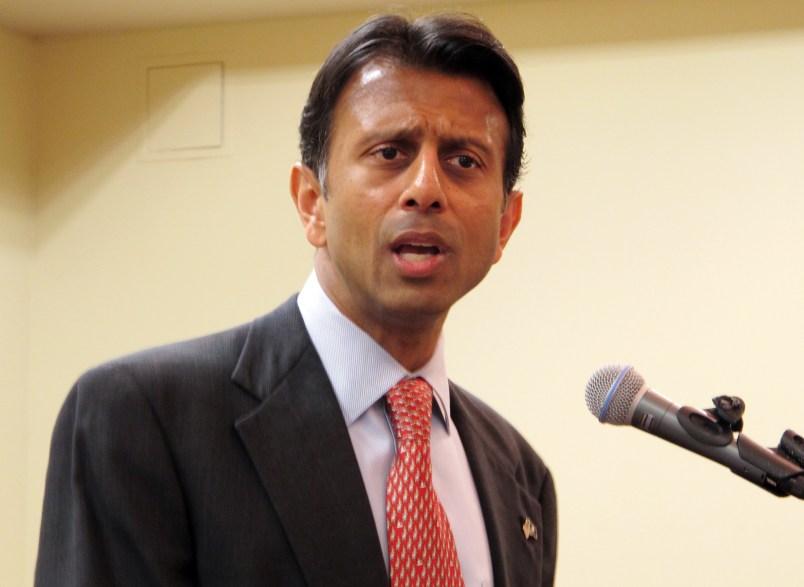Louisiana Gov. Bobby Jindal circulated the outlines of his ambitious new health care plan to reporters in Washington on Wednesday, insisting that Republicans “can’t be the party of no; we have to be the party of ideas.”
The blueprint repeals Obamacare and proposes to replace it with popular conservative ideas like health care tax breaks for individuals, letting people buy insurance across state lines, health savings accounts, tort reform, partially privatizing Medicare, and turning Medicaid over to the states.
It’s mostly vague. But where Jindal — a second-term governor with 2016 presidential ambitions — does get specific, the fatal flaws with his plan emerge.
A key component of his “Freedom and Empowerment Plan” is to guarantee care for preexisting conditions with a cash infusion of $100 billion for state high-risk pools. “As a condition of participation in the new $100 billion innovation pool,” the blueprint says, “states will be required to guarantee access for individuals with pre-existing conditions — through a high-risk pool, reinsurance or some other method ensuring those with chronic conditions can obtain needed care.”
“[Liberals are] going to falsely claim we’re not doing enough to help people with preexisting conditions,” Jindal told reporters at a breakfast hosted by the Christian Science Monitor. “That’s false.”
Jindal’s proposal would be lucky to get much Republican — let alone Democratic — support. First, as conservative health policy experts James Capretta and Tom Miller estimate, high-risk pools aimed at covering up to 4 million people would cost between $150 to $200 billion over 10 years. So Jindal’s figure is already low (although his policy director surmised that states could come up with the rest of the money). Second, the Republican-led House hasn’t shown any willingness to fund high-risk pools. In fact, last year GOP lawmakers scuttled a bill pushed by House Majority Leader Eric Cantor (R-VA) to spend just $3.6 billion on high risk pools for under a year, fully paid for with cuts to Obamacare.
“Subsidizing health care is not what Republicans should be about,” Rep. Raul Labrador (R-ID) told reporters at the time.
It reveals the great irony of the hyper-partisan health care debate. The popular preexisting conditions guarantee formed the basis for Obamacare, specifically the unpopular individual mandate, which was enacted to defray the high costs of caring for sick people. But instead of relying on high-risk pools, Democrats created an insurance exchange with consumer protections and subsidies to buy care. The mandate was the third leg of the stool, aimed at balancing the sick pool with young and healthy people.
Jindal’s plan contains various cost-saving provisions — such as tort reform and capping the amount that Medicare and Medicaid spend on beneficiaries. But he also promises to repeal Obamacare’s taxes and restore its Medicare cuts, which would add well over $1 trillion to the debt over 10 years, according to the Congressional Budget Office. It’s not clear how his plan could cover that cost and provide for sufficient new spending on high-risk pools.
Jindal’s plan also replaces the tax exclusion for employer-provided health care with a standard deduction made available to everyone, although he wouldn’t specify the level at which the deduction would be capped. Reforming the tax break is backed by policy experts left and right, and would level the playing field for individuals who don’t get insurance from their employer. But this, too, is fraught with peril because it would throw many people off employer-based care, which covers one out of every two American workers — a tough sell for Republicans who have raised hell over disruptions caused by Obamacare. A version of this idea was once pushed by Rep. Paul Ryan (R-WI), but he excluded it from his House budgets 2011 onward because it lacked sufficient GOP support.
“It is too disruptive to existing employer-provided insurance, and it does not help enough people get coverage,” wrote Ramesh Ponnuru, a senior editor at the conservative National Review. “Replacing Obamacare with this plan would probably result in millions of people losing their coverage, and I think that would doom it.”






